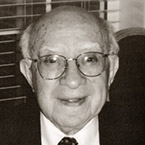
Emmanuel Farber, MD, PhD, AACR past-president (1972-1973), died Aug. 3, 2014, at the age of 95. Farber was a pioneer in cancer research and a renowned pathologist who made fundamental contributions to our understanding of chemical carcinogenesis. He had been an AACR member since 1952 and was elected as an inaugural fellow of the AACR Academy in 2013.
Farber was a very active member of the AACR throughout his 62 years of service. In addition to his tenure as president, he was a member of the board of directors, associate editor of Cancer Research, and a member of the Pennsylvania (East) State Legislative Committee and the Molecular Epidemiology Working Group. He was also honored with the prestigious AACR G.H.A. Clowes Memorial Award in 1984.
Throughout his long and prestigious career, Farber promoted the concept that to understand carcinogenesis, one must also understand the cellular, genetic, metabolic, and molecular changes that are occurring during the process. Farber’s studies in experimental pathology demonstrated that chemical carcinogens are capable of binding to nucleic acids, in turn generating specific DNA adducts. These early studies led to the observation that chemical carcinogenesis is a sequential process. He later proved this theory by showing that cancer could be induced through a series of step-by-step chemical treatments in the liver.
Farber served on the U.S. surgeon general’s first Advisory Committee on Smoking and Health from 1961 to 1964. The committee was responsible for issuing the 1964 Surgeon General’s Report, which has now done more to prevent tobacco-related disease than any other preventive measure. Farber was an early proponent of limiting tobacco use and educating the public about smoking risks, at a time when such a position was subject to attacks from industry and even from other scientists.
Born Oct. 19, 1918, in Toronto, Ontario, Canada, Farber obtained his medical degree from the Faculty of Medicine, University of Toronto in 1942. After completing his residency training in pathology at the Hamilton General Hospital in Hamilton, Ontario, he served in the Royal Canadian Army Medical Corps and later obtained a doctorate in biochemistry from the University of California, Berkeley. His distinguished academic career began at Tulane University in New Orleans, and continued with his appointment as professor and chairman of pathology and professor of biochemistry at the University of Pittsburgh School of Medicine, and then at the Fels Research Institute at Temple University School of Medicine in Philadelphia, where he was professor of pathology and biochemistry and director of the institute.
In 1975, Farber moved back to his native city to take the posts of professor and chairman of the Department of Pathology and professor in the Department of Biochemistry at the University of Toronto. At his death, he held the titles of chairman emeritus and professor in the Department of Pathology at the University of Toronto.
In addition to his dedication of extensive service to the AACR, Farber also contributed to the scientific community through many other organizations and commitments. He was vice president and president of the American Society of Experimental Pathology and president of Histochemical Society. Additionally, he served with distinction on the Panel on Medical Sciences of the U.S.-Japan Cooperative Science Program, the National Advisory Cancer Council of the U.S. Public Health Service, the Lung Cancer Task Force, the Committee on Food Safety and Food Safety Policy of the National Academy of Sciences, the chairman of the Pathology B Study section of the National Institutes of Health, the Committee on Pathology, the Division of Medical Sciences of the National Academy of Sciences and National Research Council, the Histochemical Society, and the American Society of Experimental Pathology. He was a member of the editorial boards of American Journal of Pathology; Laboratory Investigation; Journal of Histochemistry and Cytochemistry; Oncology News; Teratogenesis, Carcinogenesis, and Mutagenesis; International Journal of Cancer; Chemical Biological Interactions; Liver; and Hepatology.
Farber’s many accomplishments were recognized by his colleagues throughout his career. He was the recipient of the Parke-Davis Award in Experimental Pathology, the Samuel R. Noble Foundation Award, and the Rous-Whipple Award of the American Association of Pathologists. In 1984, Farber was made a fellow of the Royal Society of Canada, and in 1985, he was elected as an honorary member of the Society of Toxicologic Pathologists, which is the highest honor that this professional organization can bestow.
Farber is survived by his daughter, Naomi Farber, son-in-law Steven Grosby, and grandson Samuel Grosby.
Career Highlights
1987 Founders’ Award, Chemical Industry Institute of Toxicology
1986 Eastman Kodak Award, National Academy of Clinical Biochemistry
1984 AACR-G.H.A. Clowes Memorial Award
1982 The Rous-Whipple Award, the American Association of Pathologists
1980 Fellow, Royal Society of Canada
1976 The Samuel R. Noble Foundation Award
1975-1985 Professor and Chairman, Department of Pathology, University of Toronto Faculty of Medicine, and Professor, Department of Biochemistry, University of Toronto
1974-75 Director, Fels Research Institute, and Professor of Pathology and Biochemistry, Temple University School of Medicine
1973 President, The American Society of Experimental Pathology
1972-1973 President, AACR
1967 President, The Histochemical Society
1964-1967; 1970-1973 Board of Directors, American Association for Cancer Research
1961-1970 Professor and Chairman, Department of Pathology, and Professor, Department of Biochemistry, University of Pittsburgh School of Medicine
1949 PhD, Biochemistry, University of California, Berkeley
1942 MD, Faculty of Medicine, University of Toronto